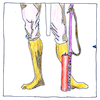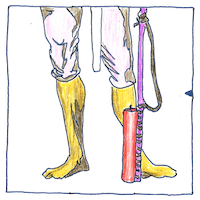Hyder Ali,
Tipu Sultan
manufacturing

|
Mysorean rockets
Hyder Ali’s father commanded rocket men for the ruler of the Carnatic. Those rockets burned gunpowder and were similar to the Chinese fire arrow. The rulers of Mysore hired Hyder Ali because of his military skills, after which he became the defacto ruler as the kingdom’s chief minister. Hyder Ali improved their rockets by increasing the saltpeter in the propellant and incasing the combustion chamber in iron. During the Anglo-Mysore Wars Hyder Ali and his son, Tipu Sultan, engaged in a series of military and diplomatic maneuvers against the British East India Company and neighboring states, sometimes assisted by the French. During the Battle of Pollilur in the Second Anglo-Mysore War Tipu Sultan first deployed improved rockets against Colonel William Baille of the British East India Company. Tipu Sultan fitted some of his rockets with sword blades that caused damage when they descended into opposing troops.
Fathul Mujahidin
Each Mysorean cushoon included up to two hundred rocket men. Eventually, Tipu Sultan commanded about five thousand rocket men. The rocket men had a selection of rockets, some fitted with sword blades and some designed to explode on landing. Some were for short distances and some for long. Each rocket man was trained to launch rockets at an angle that depended on the type of rocket and the distance to the target. In addition to hand-held launchers, the Mysorean rocket men could deploy a frame of tubes for launching up to ten rockets at once.
The impermanence of war
It took many years to see whether the Mysoreans or the British had the strongest forces. The Mysorean cushoons launched thousands of rockets, but on the long side of history what has survived? When you shoot off a rocket and it explodes; that’s it. Whereas things worth defending could offer a different way to pacify an enemy.



After defeating Tipu Sultan during the Fourth Anglo-Mysore War, the British captured the iron-cased rockets of Mysore, and these influenced the development of the Congreve rocket that the British Royal Navy deployed during the Napoleonic Wars.
Fathul Mujahidin is the title of the manual that Tipu Sultan instructed Zainul Abedin Shustari to write to guide the training of his rocket men.
The real battle here was not between the Mysoreans and the East India Company; it was between individualism and the community, between the financial company and the feudal state.
See also in The book of science:
Readings in wikipedia: